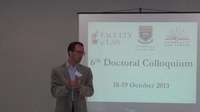Eighteen chapters presented at the 6th doctoral colloquium
The Doctoral Colloquium programme is designed to positively support doctoral researchers during the process of writing their thesis. The doctoral researchers present their draft chapters of the thesis to a group of peers and experts. They immediately receive comments from an expert in the field and then discuss the chapter with their peers and supervisor in an open session. This time around 18 Chapters were presented on Friday and Saturday.
The director of the Community Law Centre, Prof Jaap de Visser, when delivering his opening remarks, pointed out that since its inception the colloquium has proven to be a useful tool. “It doesn’t only give the doctoral scholars a chance to reflect on their papers. It also gives them presentation skills, which will help them deliver excellent talks at conferences.
He also assured the scholars that the Community Law Centre and the Law Faculty are continuously looking for ways to improve the colloquium. He said that the suggestions from participants are always welcome. There were evaluation forms distributed for the participants to share their thoughts.
One of the presenters, Enoch Chilemba said he was grateful to have been given this opportunity to present his chapters as this will give him an opportunity to get views on his papers from the other peers. He also pointed out that the colloquium gives one a chance to have comments from different people rather than just one supervisor. He said the respondents also give elaborate comments which helps on when going back to polish the discussed chapter.
Another presenter, Thulaganyo Selokela said she was glad to have shared her proposal with others at an earlier stage. She says this world-class session gave her an opportunity to get different views about her thesis and she will be able to make it sharper with the comments she got from the colloquium. She pointed out that this is a great platform for constructive critique and engagement with other doctoral scholars. She said that the fact she is able to listen to other presenters also helps her to plan writing her thesis.
The evening ended with an informal networking sessions where the researchers and their peers got an opportunity to discuss papers, which were presented in an informal session.
Three times a year, each doctoral researcher is invited to an idyllic location in Cape Town to participate in a stimulating and encouraging Doctoral Colloquium.
About: The Community Law Centre
The Community Law Centre is founded on the belief that constitutional orders must promote good governance, socio-economic development and the protection of the rights of vulnerable and disadvantaged groups. Through engaged research, engaged teaching and advocacy, the Centre supports processes in South Africa and the region to build inclusive, resilient states that are accountable to citizens and responsive to human rights. The Centre aims to be the leading think tank on multi-level governance and human rights in Africa.
Editorial contacts:
Jacob Nthoiwa
Information Manager, Community Law Centre
University of the Western Cape
+27 21 959 2950
knthoiwa@uwc.ac.za

